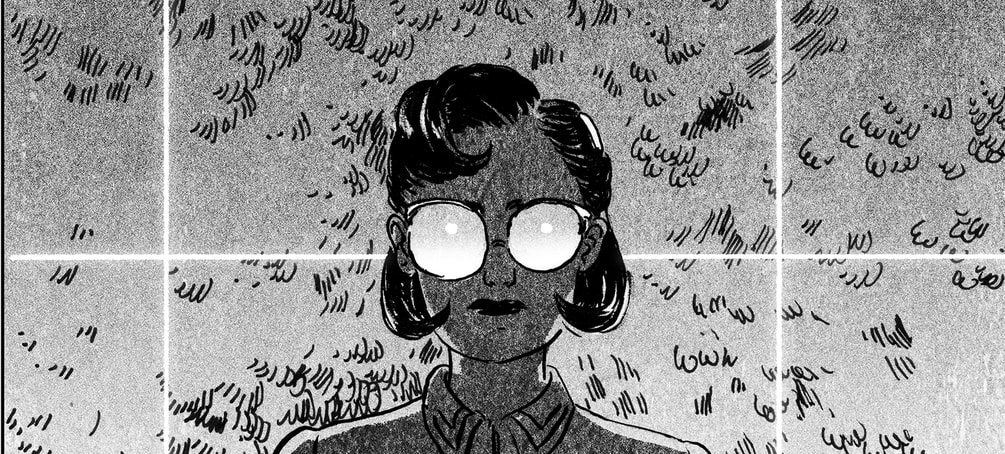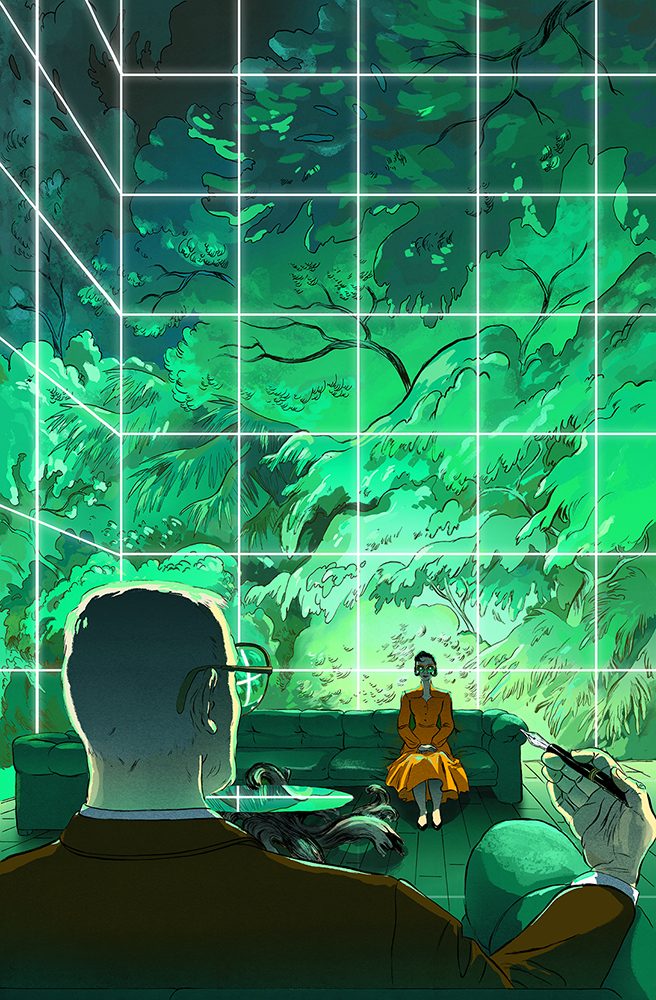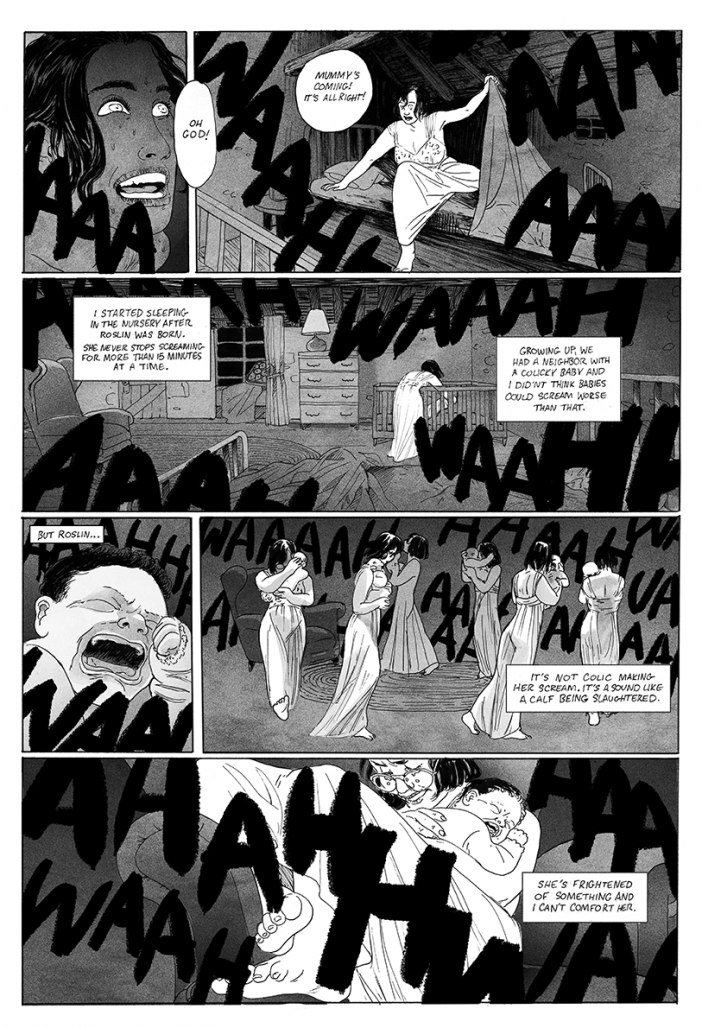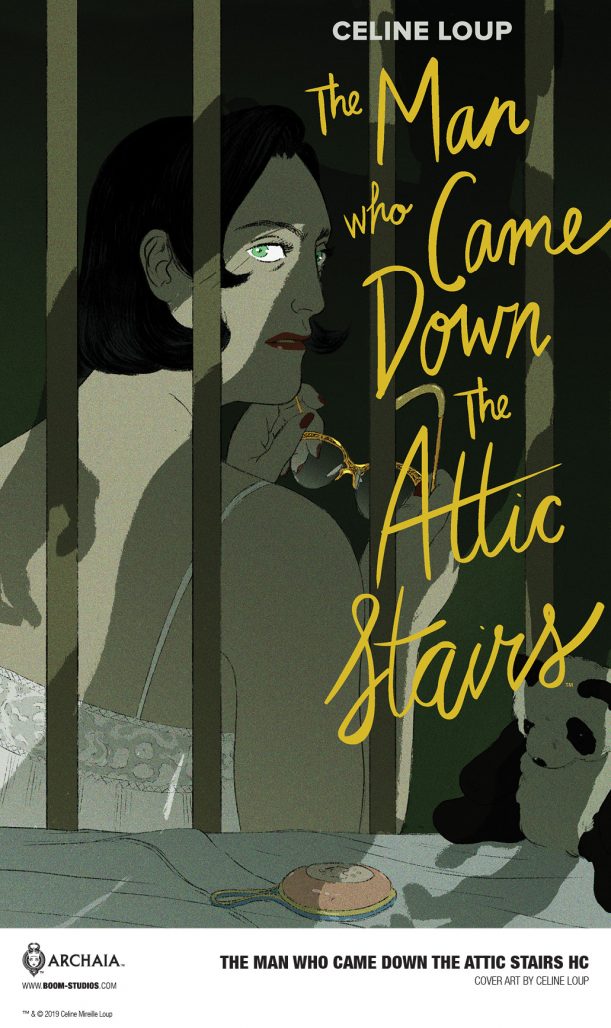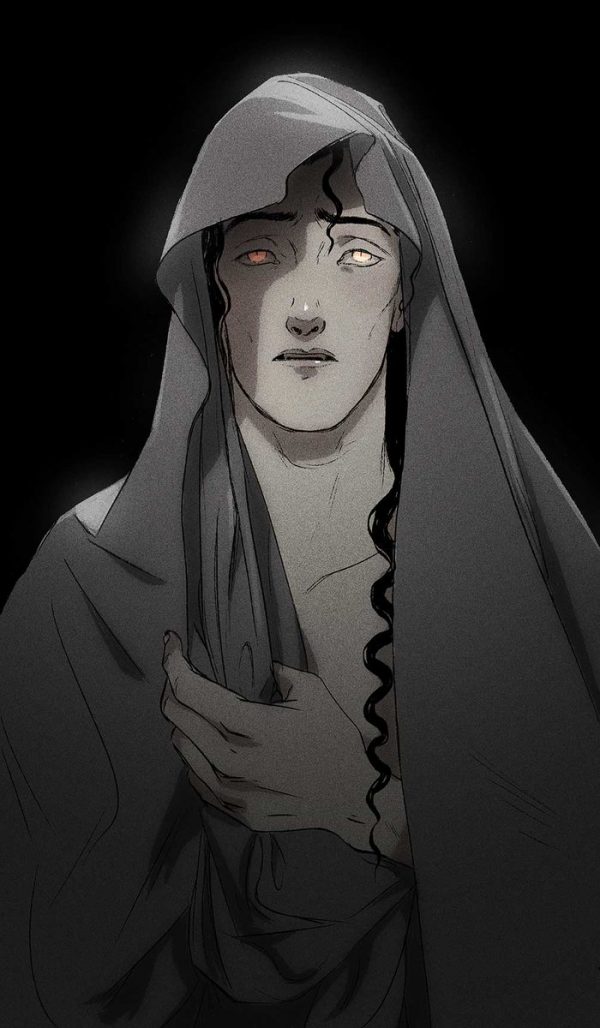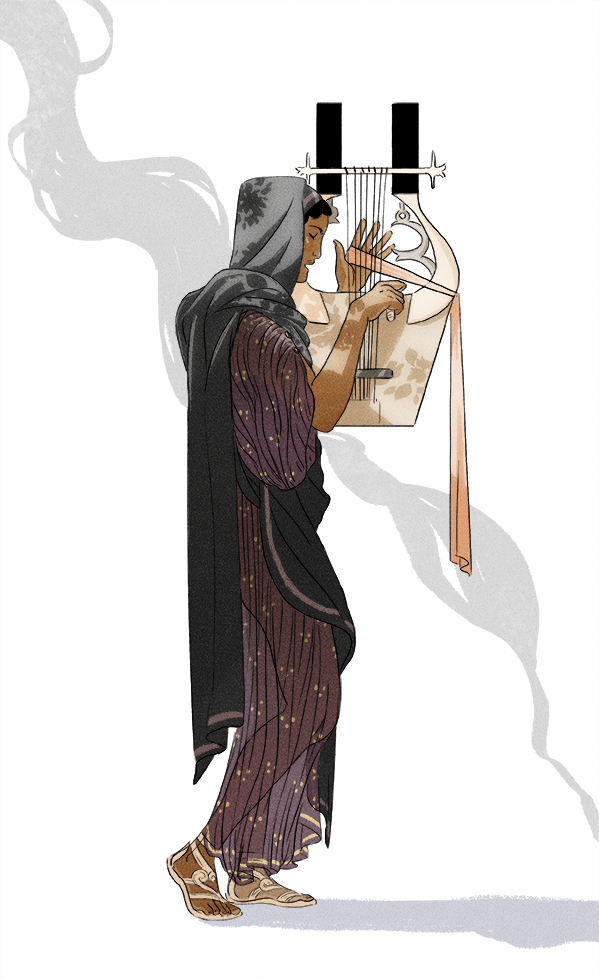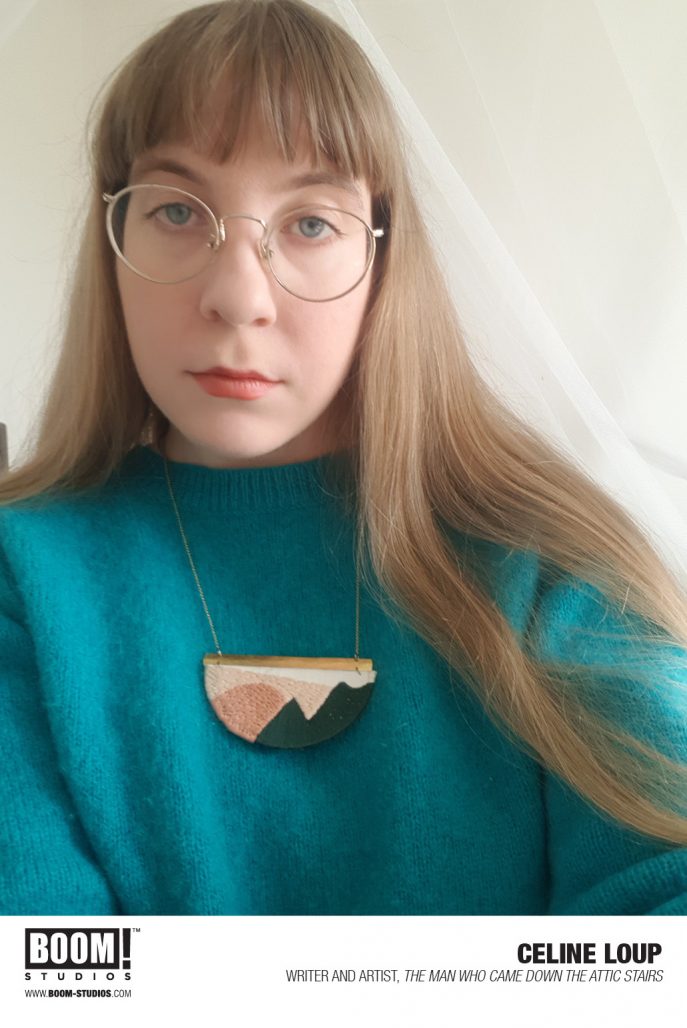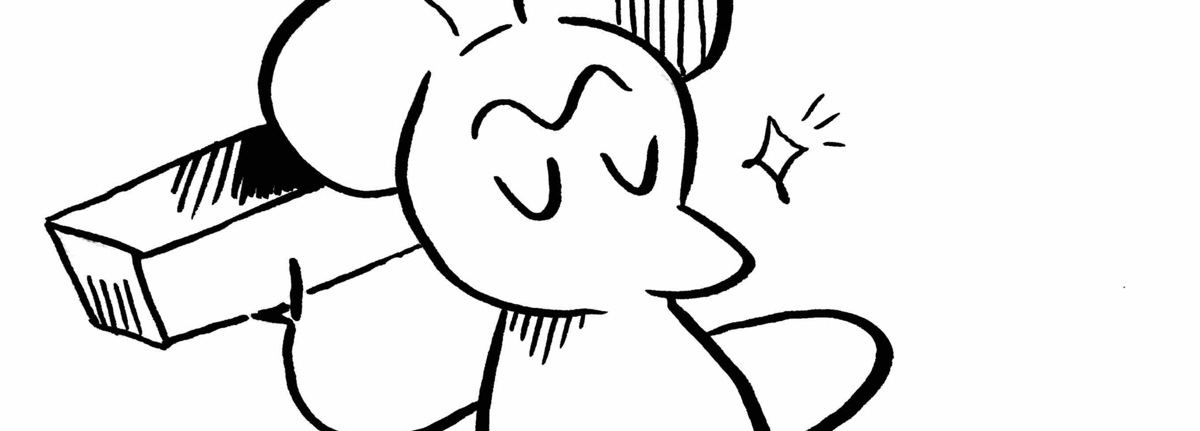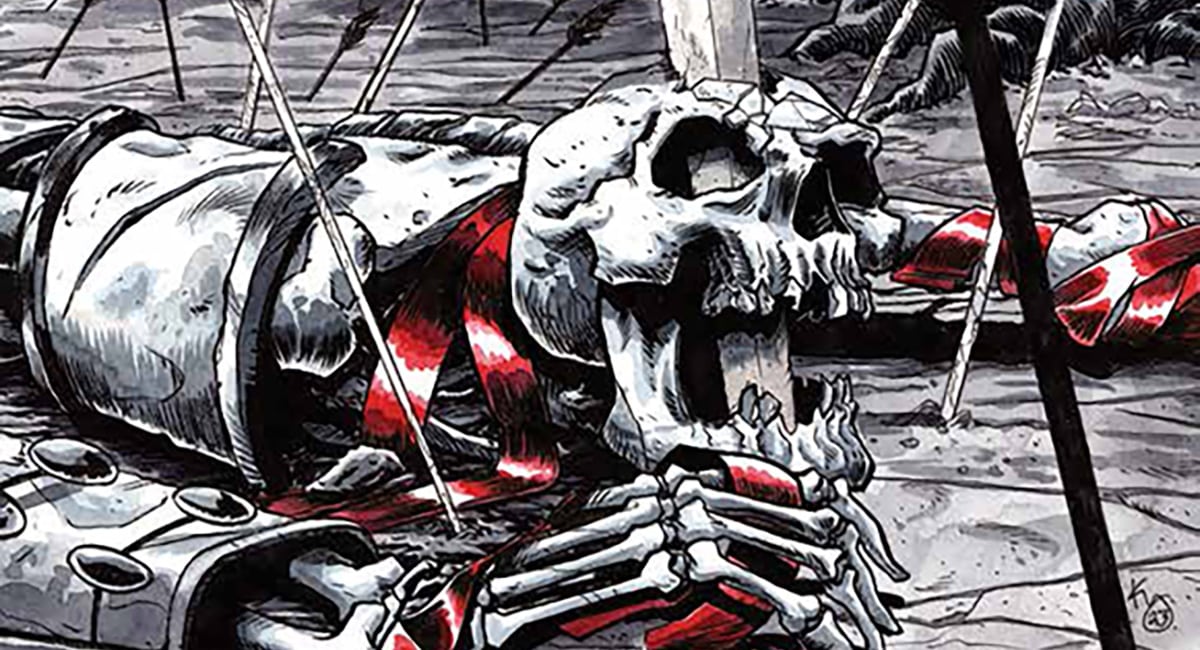The Toronto Comic Arts Festival is one of the most influential and important comic book event in North America. Its mission is to “promote the creators of comic books in their broad and diverse voices, for the betterment of the medium of comics”. In the spirit of this mission, The Beat has conducted a series of interviews with some of the phenomenal cartoonists in attendance at this year’s festival. We hope that these interviews will improve our understanding of these creators’ voices, techniques, interests and influences. Read on for our interview with Celine Loup.
Celine Loup is an illustrator and cartoonist based in France. Her work has been featured in countless publications such as The New Yorker, Lucky Peach and The New York Times. Her 2017 Ignatz-nominated self-published comic The Man Who Came Down The Attic Stairs will be re-released by BOOM! Studios in the Fall of 2019. Celine has gracefully agreed to chat about watercolours, The Man Who Came Down The Attic Stairs and her new long-term serialized comic Hestia.
Philippe Leblanc: For those readers who may not be familiar with you and your work, can you tell us a little bit about yourself?
Celine Loup: Sure. I’m an illustrator and comics artist currently living in France. I grew up in Maryland and went to art school in Baltimore. I initially took work as an editorial illustrator for various publications, but have switched to making comics full time. I tell stories about love, sex, death, and despair — all the Big Emotions.
Leblanc: Before we get into your comic work, I wanted to talk about some of your work as an illustrator. I’m constantly amazed by the way you create elegant and delicate work using pastel colours. Could you tell us about the use of colours in your work?
Loup: I think the way I use color has been to use limited palettes in order to fool people into thinking I know what I’m doing. I’m only just now in my 30s seriously studying painting and color theory! But I mostly just rely on intuition; there’s no deliberate message behind my colors.
Leblanc: You moved to France in 2016. How has that impacted your work?
Loup: It’s made me think about isolation and loneliness in a whole new way. My mother moved to France to be with my father before I was born, and she experienced motherhood in near total isolation on their farm in the Loire Valley. I’ve been trying to bridge our respective experience with expatriation and womanhood in my work. It’s certainly given me an even more intense hatred for people who shit on immigrants, especially those who judge them for wanting to build communities amongst themselves. Having a refuge where people understand you and speak your language can be all that saves you from despair.
Leblanc: We’ve recently learned that your 2017 self-published comic The Man Who Came Down the Attic Stairs will be published by BOOM! Studios in the Fall of 2019. Did you expect this comic to have a second life?
Loup: I really wasn’t sure how people would receive it; it’s such an intensely personal, weird comic and I don’t really see other people using the medium to tell stories like these. I was so amazed when people responded so positively towards it; it gave me hope that there’s room for these kinds of uncomfortable books. I was very happy when BOOM! approached me to expand it; there are things I wish I’d gotten to do the first time around that I wasn’t able to for lack of time.
Leblanc: The Man Who Came Down The Attic Stairs is the story of Emma, starting a family with her husband. After her child’s birth, she finds her world turned upside down and begins to encounter strange things in the house and a very different relationship with her husband. Could you tell us more about the creation of this comic?
Loup: Sean T. Collins approached me on behalf of 2dCloud for their upcoming horror anthology Mirror Mirror, asking me to pitch a story with the theme of the abject. I love Sean and wanted to give him my best, despite being mired in a bad situation with another publisher and facing a transatlantic move. I got about halfway done with it, working in isolation on a single desk that doubled as our dining table for a month, before things with my other publisher forced me to abandon the project; instead I gave them a 2 page spread illustration. I still wanted to finish the book, so I ended up doing that while waiting for things to resolve with my publisher. I self-published it and sold it at cons and in my shop, and submitted it to the Ignatz awards. If it hadn’t gotten nominated I’m not sure people would have heard about it much to be honest!
Leblanc: You’ve taken inspiration from the work of Shirley Jackson and Ira Levin, two fantastic thriller, suspense and horror writers. What appealed to you in their work that you wanted to bring to The Man Who Came Down The Attic Stairs?
Loup: Shirley Jackson wrote with more depth and sensitivity than anyone I know about the suppression of women’s feelings and the consequences. Ira Levin wrote Rosemary’s Baby and The Stepford Wives, and I love the way she describes how men control and define our lives so completely that by the time we realize something is wrong, it’s far too late. Not just the men we fall in love with, but the men in charge of our medical care, our housing, the laws and policies we live with, our employers, law enforcement, art critics, urban designers, etc. The world we navigate was engineered to cater to men’s needs, especially their emotional needs, and both these authors explore the terrible consequences of that unspoken truth in ways I aspire to.
Leblanc: I’ve found that the idea of exploring post-partum depression and the fear of motherhood to be quite interesting. My wife and I have found the first months of parenthood to be quite difficult on the both of us. There are a lot of complicated feelings that come with having a child and not something we’ve often seen explored in fiction. What made you want to create this comic?
Loup: When Sean approached me, I thought about the things that terrify me most that I never see anyone telling stories about (at least in comics). I’d had a dream that I’d given birth to a baby and had simply left her to starve to death in a crib in our attic, and was lying to everyone I knew that I was taking good care of her. I thought about the pressure women feel to be excited about motherhood and the lack of support they get at every level, and the demonization of women who kill their infant children because there is so little help for mothers experiencing postpartum depression and psychosis. I thought about how having a baby changes everything about women’s lives, often for the worse, and how we’re not supposed to talk about that, and how women have to just fucking pray that they take to motherhood because if they don’t that’s the rest of their life and their child’s life. There’s no way to know beforehand if you’ll like being a mother, and there’s absolutely no sympathy for women who discover that they don’t. All of this stuff is such rich ground for new work and when I was coming up with this story I couldn’t find much like it in comics. I need stories like these because I’m afraid and I know a lot of my friends are too, and we deserve to explore these fears in fiction.
Leblanc: There’s another component from your work that is further removed from your illustration or self-published comics like Honey or Mother. You’ve been doing an erotic comic called Hestia that’s been serialized on Patreon. It’s an adult, supernatural, erotic romance set in ancient Greece. Can you tell us a bit more about this work?
Loup: It’s actually in pre-production right now; that means I’m writing the script and doing concept art. I’m in the middle of the second act and a story like this takes mountains of research, so it’ll be a while before I start posting finished pages. Basically, it’s about a shepherd named Hestia who has to marry two men to save her family’s farm. I created a fictional culture on a fictional island in the aegean sea where men choose each other to go into arranged marriages to one woman. I wanted to tell a story about culture, and about gender and trauma, and I wanted to write about sex the way men write about war; I wanted to elevate something people think of as trashy because it’s just as much a part of the human experience.
Leblanc: Your work often addresses an underlying element of fiction. Honey is an exploration of anthropomorphic tropes while also looking at how communities operate, for example. Hestia is the goddess of hearth in Greek mythology. What inspired you in her story that made you want to explore it in deeper details?
Loup: I chose the name “Hestia” for my protagonist because my story is fundamentally about creating a home for each other, in the face of irreconcilable differences of personality and culture and class, and after someone has experienced so much pain and trauma they think they’ll never be able to have a normal life.
Leblanc: My understanding is that you’ve done a lot historical research and on-location visual research to make your comic as accurate as possible. Do you feel you were able to get a better understanding of your story?
Loup: I’ve always loved ancient art, but this project gave me an excuse to do a deep dive into Greece’s art history and it has been such a delight to discover for myself. I look at the work of the Berlin painter and wonder if I can really ever top that, you know? But also, I’m fascinated by cultural differences, and it’s been a challenge to tell a story about people whose values are completely alien to us to an audience that takes our modern values for granted. I think it’s essential to engage with these differences and understand them if we are to understand ourselves, but that often means pressing our hands to a stove: people have always accepted extremely fucked up things as normal; men have always done extremely bad things, even very good men. I don’t think I’d make art unless I felt like I could hold these painful truths in my hands.
Leblanc: What do you want readers to take with them once they’ve finished reading your comics?
Loup: I want them to feel like they can face the world, those they love, those they hate, and themselves, with greater compassion, honesty, and courage. That’s the transformative power of art, for me.
You can find Celine Loup’s work on her website, read her comics, and get some information on The Man Who Down The Attic Stairs. You can also follow her on Twitter & Instagram and support her through Patreon or her online store and on Gumroad.
You can come meet Loup during TCAF. She’s excited to talk to you about her work.


